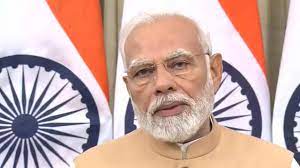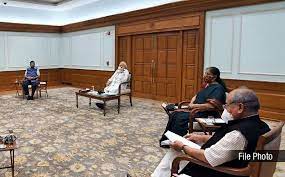
Current Affairs is the most important area in all competitive exams. But the difficulty level is very high. That’s why; many aspirants get confused, how to select Current Affairs for Preparation of Competitive Examination? In this Post, Daily Current Affairs 2 June 2023, we have tried to cover each and every point and also included all important facts from National/ International news that are useful for upcoming competitive examinations such as UPSC, SSC, Railway, State Govt. etc.
So, here is the Top News of the Day for 2 June 2023 to help you prepare the Latest Current Affairs part. After reading this section, you can successfully attempt Current Affairs Quiz.
Current Affairs for Competitive Exam – 2 June 2023
Amarendu Prakash Takes Charge As Sail Chairman

Amarendu Prakash takes charge as SAIL chairman
Amarendu Prakash is the new Chairman and Managing Director of Steel Authority of India Ltd (SAIL), effective May 31.He was previously the Director (In-charge) of SAIL’s Bokaro steel plan. Prakash was previously involved in driving business transformation and financial turnaround of SAIL, which resulted in bringing back the company from a three year streak of losses, from FY16 toFY18, to being back in the black in FYI9.
He has been the Director In-Charge of the Bokaro Steel Plant since September 2020, and he previously served as Director In-Charge of the Rourkela Steel Plant, IISCO, and Durgapur Steel Plant. Under his able leadership, the Bokaro Steel Plant has seen remarkable results, with the plant continuing to break production records, year after year in FY22 and FY23.
History of SAIL
The Steel Authority of India Ltd (SAIL) is one of India’s leading steel producers. It was founded on January 19, 1954, and its headquarters are in New Delhi. SAIL was created as a public sector undertaking (PSU) under the Ministry of Steel, Government of India, with the objective of promoting the development and production of steel in the country.
The history of SAIL can be traced back to the First Five-Year Plan (1951-1956) of India, where the government recognized the importance of developing a robust steel industry to support industrialization and infrastructure development. As a result, the Hindustan Steel Limited (HSL), which eventually became the flagship firm of SAIL, was established in 1954.
Over the years, SAIL played a crucial role in the growth and development of the Indian steel industry. It expanded its operations by setting up integrated steel plants in various parts of the country. The company initially focused on the production of iron and steel at its plants in Bhilai, Rourkela, and Durgapur. These plants became the backbone of the Indian steel industry and played a significant role in meeting the growing demand for steel in the country.
In the 1970s and 1980s, SAIL embarked on a major expansion plan to increase its steel production capacity. It established new steel plants, including Bokaro Steel Plant in Jharkhand, Visvesvaraya Iron and Steel Plant in Karnataka, Salem Steel Plant in Tamil Nadu, and Alloy Steels Plant in West Bengal.
Important takeaways for all competitive exams:
- SAIL Founded: 24 January 1973;
- SAIL Headquarters: New Delhi;
- SAIL CEO: Soma Mondal (1 Jan 2021–).
Shashi tharoor released a book titled “ringside” written by Dr. Vijay Darda

A book titled “Ringside” written by Dr. Vijay Darda
Dr. Shashi Tharoor, renowned author and Congress MP, published the book “Ringside,” written by Lokmat Media Group Editorial Board Chairman and former MP Dr. Vijay Darda. “Ringside” is a compilation of Dr Darda’s weekly articles published between 2011 and 2016 in Lokmat Media Group newspapers and other leading national and regional dailies.
The essence of the book:
The book is a sequel to Dr. Darda’s previous work, “Straight Thoughts,” and it covers a wide range of issues including science, ecology, economy, security, social development, sports, arts, culture, and foreign policy. It offers an intellectual journey as well as national and international concerns. “Ringside” provides readers with insight into contemporary political, social, cultural and important events and developments. With a comprehensive exploration of important topics, the book aims to engage readers and provide a deeper understanding of the current political and social landscape.
Defence Exports Of India Up By 23 Times Since 2014

Defence exports of India up by 23 times since 2014
India’s defence exports have reached a new high, rising from 686 billion rupees in 2013-14 to roughly 16 billion rupees in 2022-23. This impressive growth of 23 times demonstrates India’s advancement in the global defense manufacturing industry.
Defence exports of India up by 23 times since 2014: Key Points
- With exports to more than 85 nations, India’s defence sector has shown to the international community its ability to design and build high-quality goods.
- Currently, 100 companies are engaged in exporting defense goods.
- The government has implemented several policy initiatives and reforms in the past nine years to bolster defense exports.
- The Atmanirbhar Bharat initiatives have greatly benefitted India by promoting indigenous design, development, and manufacturing of defense equipment within the country.
- This strategy aims to reduce dependence on imports in the long run.
- As a result, the expenditure on defense procurement from foreign sources has decreased from 46 percent of the overall expenditure in 2018-19 to over 36 percent as of December last year.
- In the past, India was mainly recognized for importing defense equipment.
- However, things have changed, and India today exports a variety of key military equipment, including the Dornier-228 aircraft, artillery guns, Brahmos Missiles, PINAKA rockets and launchers, radars, simulators, and armoured vehicles.
Additionally, there is an increasing global demand for India’s own products, including the LCA-Tejas, Light Combat Helicopters, Aircraft Carriers, and MRO (Maintenance, Repair, and Overhaul) activities.
City Investments To Innovate, Integrate And Sustain 2.0 (Citiis 2.0) From 2023 To 2022

Why the Scheme is in News?
The Union Cabinet, led by Prime Minister Shri Narendra Modi, has approved the City Investments to Innovate, Integrate, and Sustain 2.0 (CITIIS 2.0) programme. This program, developed by the Ministry of Housing and Urban Affairs (MoHUA), in collaboration with the French Development Agency (AFD), Kreditanstalt für Wiederaufbau (KfW), the European Union (EU), and the National Institute of Urban Affairs (NIUA), will be implemented from 2023 to 2027.
Introduction
CITIIS 2.0 seeks to assist chosen projects that promote circular economy practises, with a special emphasis on integrated waste management at the city level. It also aims to implement climate-oriented reform actions at the state level and strengthen institutions and disseminate knowledge at the national level.
About City Investments to Innovate, Integrate and Sustain 2.0 (CITIIS 2.0)
The program builds upon the lessons and achievements of CITIIS 1.0, which was jointly launched in 2018 by MoHUA, AFD, EU, and NIUA. CITIIS 1.0 had a total budget of ₹933 crore (EUR 106 million) and consisted of three components:
Component 1: city-level projects selected through a competitive process
Component 2: Capacity development activities in the state of Odisha
Component 3: The promotion of integrated urban management at the national level through NIUA, which served as the Program Management Unit (PMU) for CITIIS 1.0.
CITIIS 2.0: Key Objectives and Benefits
Technical assistance was provided through the program at different levels using domestic, international, and cross-functional experts. Through a finance approach that emphasises competition and collaboration across federal authorities, this aid has resulted in the adoption of innovative, integrated, and sustainable urban development practises.
CITIIS 2.0, following the CITIIS 1.0 model, consists of three main components:
Component 1: Providing financial and technical support to develop projects that focus on enhancing climate resilience, adaptation, and mitigation in up to 18 smart cities. These projects will be selected through a competitive process and will promote a circular economy, with a specific emphasis on integrated waste management.
Component 2: All states and union territories (UTs) are eligible to receive support based on their demand. This support includes establishing or strengthening state climate centers/cells, creating climate data observatories at the state and city levels, enabling climate-data driven planning, developing climate action plans, and building the capacity of municipal officials. The National Institute of Urban Affairs (NIUA) will coordinate the provision of technical assistance and strategic support to state governments to achieve these objectives.
Component 3: Implementing interventions at the central, state, and city levels to enhance climate governance in urban India. This involves strengthening institutions, disseminating knowledge, fostering partnerships, building capacity, conducting research and development, and supporting scaling up efforts across all states and cities.
Funding of CITIIS 2.0
A loan of Rs. 1,760 crore (EUR 200 million) from AFD and KfW (EUR 100 million each) is part of the finance for CITIIS 2.0, as is a technical assistance grant of Rs. 106 crore (EUR 12 million) from the EU.
CITIIS 2.0: Vision
CITIIS 2.0 will complement the climate initiatives of the Government of India, including existing national programs such as the National Mission on Sustainable Habitat, AMRUT 2.0, Swachh Bharat Mission 2.0, and Smart Cities Mission. It will also contribute positively to India’s commitments under the Intended Nationally Determined Contributions (INDCs) and Conference of the Parties (COP26).
Noted Sanskrit Scholar Ved Kumari Ghai Passes Away

Noted Sanskrit scholar Ved Kumari Ghai passes away
Ved Kumari Ghai, a Sanskrit scholar, died at the age of 91. In 1931, she was born in Jammu City, Jammu & Kashmir. She did her MA and PhD in Sanskrit from the University of Jammu. She also studied at the Banaras Hindu University and the University of Oxford.
Ghai was a renowned scholar who wrote numerous volumes on Sanskrit literature. She began her career as a Sanskrit lecturer at the Government College for Women in Parade, Jammu. She was a head of post graduate level Sanskrit Department, Jammu University until her retirement on 31 December 1991. She taught Panini’s Sanskrit grammar and literature at the Institute of Indian Studies, Copenhagen University, Denmark in 1966–1967 and 1978–1980. She was a scholar in Dogri language and also knew Hindi. She was also involved in social work. She was a member of the Amarnath shrine board.
Ghai was awarded the Padma Shri, the fourth-highest civilian award in India, in 2001 for her contributions to Sanskrit literature. She was also a recipient of the Sahitya Akademi Award, the highest literary award in India, in 1991 for her book “The Sanskrit Language”.
Here are some of her notable works
- The Sanskrit Language (1991)
- A History of Sanskrit Literature (1996)
- The Ramayana (2000)
- The Mahabharata (2003)
- The Bhagavad Gita (2005)
Ghai’s work has been praised by scholars around the world. She was a pioneer in the field of Sanskrit studies and her work has helped to make Sanskrit literature more accessible to a wider audience. She was a true scholar and her work will be remembered for generations to come.
Maharashtra Government Launched Namo Shetkari Mahasanman Yojana

Namo Shetkari Mahasanman Yojana
The Maharashtra government has recently launched a new financial scheme aimed at providing support to farmers in the state. The Namo Shetkari Mahasanman Yojana scheme was authorised at a Cabinet meeting presided over by Chief Minister Eknath Shinde.
An overview of the Namo Shetkari Mahasanman Yojana
- Financial Assistance for Farmers: Farmers in Maharashtra would get an annual payout of Rs 6,000 under the Namo Shetkari Mahasanman Yojana. This financial assistance is in addition to the Rs 6,000 instalments that farmers already receive through the Centre’s Pradhan Mantri Kisan Samman Nidhi Yojana. The scheme aims to provide an extra boost to the income of farmers and enhance their financial stability.
- Beneficiaries and Approval: More than one crore farmers in Maharashtra are expected to benefit from the state government’s Namo Shetkari Mahasanman Yojana. This initiative is part of the government’s efforts to support the agricultural community and improve their overall well-being.
- Initiative Announced in the Budget: The Namo Shetkari Mahasanman Yojana was first introduced in the budget for the fiscal year 2023-24 by Deputy Chief Minister Devendra Fadnavis, who also acts as the state’s finance minister. The scheme’s inclusion in the budget reflects the government’s commitment to addressing the challenges faced by farmers and strengthening the agricultural sector in Maharashtra.
- Supporting Farmers’ Livelihoods: With the launch of the Namo Shetkari Mahasanman Yojana, the Maharashtra government aims to alleviate financial burdens faced by farmers and promote their economic well-being. By providing direct financial assistance, the scheme intends to empower farmers and enable them to overcome challenges and invest in their agricultural activities.
GOI Appoints Ashwani Kumar As MD Of UCO Bank

GoI appoints Ashwani Kumar as MD of UCO Bank
The government has nominated Ashwani Kumar to replace Soma Sankara Prasad as managing director of UCO Bank, whose term is coming to an end. Kumar is currently an executive director at Indian Bank, and he was previously the Chief General Manager of Punjab National Bank. The central government appoints Ashwani Kumar as managing director and chief executive officer in UCO Bank for a period of three years, the Finance Ministry said in a notification. The appointment comes into effect from the date of assumption of office on or after June 1, 2023 or until further orders.
Kumar, a chartered accountant, ascended through the ranks of five public sector banks, including Bank of Baroda, Corporation Bank, Oriental Bank of Commerce, Punjab National Bank, and Indian Bank. His work experience includes working in wholesale banking division and as head of several branches (including Industrial Finance Branches). As general manager, he was heading mid corporate and large corporate verticals and was also chief financial officer.
About UCO Bank
- UCO Bank, formerly United Commercial Bank, is an Indian public sector bank, established in 1943 in Kolkata. It is one of the 21 public sector banks in India. The bank has a network of over 4,000 branches and 10,000 ATMs across India. It also has a presence in Hong Kong and Singapore.
- The bank was founded by G.D. Birla, an Indian industrialist, in 1943. The bank was founded in Kolkata with an issued capital of 2 crores, of which 1 crore was actually paid up. Birla was its chairman, and the Board of Directors included notable Indians from several fields.
- The bank was nationalized by the Government of India on July 19, 1969. This historic event brought about a sea-change in the entire fabric of the bank’s thinking and activities, commensurate with the government’s socio-political approach of mass banking as against class banking hitherto practised.
- • The bank has expanded steadily throughout the years. Its entire revenue has increased from 2 crores in 1943 to 3.24 lakh crores in 2020-21. The bank is ranked 80 on the Fortune India 500 list and 1948 in Forbes Global 2000 list.
- The bank is committed to providing comprehensive financial solutions to its customers. It offers a wide range of products and services, including savings accounts, current accounts, fixed deposits, loans, insurance, and foreign exchange. The bank also has a strong focus on corporate banking and SME banking.
- UCO Bank is a good corporate citizen. It is dedicated to long-term social and environmental sustainability. The bank has implemented various initiatives to promote financial inclusion, education, and healthcare. It has also taken steps to reduce its carbon footprint.
- UCO Bank is a trusted financial institution with a long and rich history. It is committed to providing its customers with the best possible banking experience.
India Emerges As Key Source Country For Fdi Into Dubai

According to a report released by ‘fDi Markets’, a service from UK’s Financial Times Ltd, India has emerged as a key source country for FDI in Dubai, one of the wealthiest of the seven emirates in UAE.
The top sectors by FDI projects from India into Dubai in 2022 were software & IT services (32%), business services (19%), consumer products, real estate, and financial services.
The top sectors by FDI capital from India into Dubai in 2022 were consumer products (28%).
Aegon First To Provide Life Insurance Cover For Surrogate Mothers

Aegon Life has become the first insurance company to launch a policy that covers surrogate mothers and egg donors.
Aim: To support the financial well-being of surrogate mothers and egg donors
The new cover aligns with the Surrogacy (Regulation) Act, 2021 and the Assisted Reproductive Technology (Regulation) Act, 2021, introduced by the Ministry of Health & Family Welfare.
It provides a three-year life cover for surrogate mothers and a one-year cover for egg donors
India-Eu Connectivity Conference Held In Meghalaya

The India-EU Connectivity Conference is being organized in Meghalaya on June 1, 2023. It is jointly organized by the Ministry of External Affairs, EU Delegation to India, and the Asian Confluence.
Aim: To explore possibilities of boosting connectivity investments in India’s North Eastern States and with India’s neighbours — Nepal, Bhutan, and Bangladesh
It was inaugurated by Meghalaya CM Conrad Sangma, and MoS for External Affairs Dr. Rajkumar Ranjan Singh.





